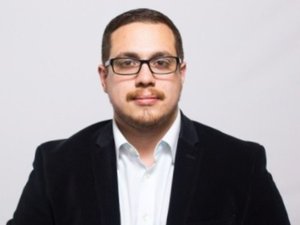Melissa Hunfalvay isn't your usual health tech entrepreneur. She came to the U.S. from Australia for school on a sports scholarship. She was a professional tennis player even while pursuing her master's and doctorate degrees.
That's why the shift to health tech is both surprising and expected. Hunfalvay loves research and acknowledges its importance, but she was starting to feel the urge to take her research and do something with it. That's how RightEye came about.
Hunfalvay met her co-founder, Adam Gross, when a mutual friend suggested they meet up and play tennis together. RightEye is a Bethesda-based health technology company that uses eye-tracking technology as a health measurement meter, such as gauging if an athlete has a concussion or help people expand their periphery vision. The technology has taken off. Hunfalvay has given a TEDx Talk in Foggy Bottom this year, they've developed 30 new tests in the past year and they're rolling out a new test to detect autism in children.
Why did you want to become an entrepreneur?
I had the path of being a consultant or a scientist or being a professor at a university, and the reason why I didn't want to do that is because I could do a lot of really great research, but it wouldn't necessarily help the person that mattered.
In my view, research is great, and it's the foundation for everything we do, but unless it gets out to the people that matter in a way that is easy for them to understand and get value from, then it doesn't have the kind of impact that I want it to have.
That's why I went the route that I did with Adam and RightEye and set up this business. I think we can still have the research as our foundation, but I think we could make a greater difference to the world because we're able to get it to the people who really need it.
You were a professional tennis player. Are there any skills you gained from that career that helped you when you started a business?
It's kind of funny that you ask that because I used to do a lot of business with the military and I set up a program of eye-tracking with them. And I was sitting in a general's office one time, and he said to me "There's a reason why you walk into my office and you see books on athletes, and you see books on successful business people. We all have the same characteristics."
Everybody's who got the same success has the same types of characteristics: You're driven, you've got passion and you want to make a difference. And that's what drives any kind of success. It's not about the money or else we wouldn't be spending the amount of time to get out our passion. Money just doesn't buy that.
You're driven, you've got passion and you want to make a difference. And that's what drives any kind of success.
Where do you see your company heading in the next few years?
A few years for us is like a lifetime. We move very rapidly. So in the last year, we've built 30 tests. One set is neurology based tests — so examining concussions versus normal neurological type behavior. We have another set of tests that are optometry focused — so binocular vision and those kinds of things. And then we have another set of tests that are performance-based tests that are basically going from good to great and more on the performance sport and military side.
Going forward, we're going to build on those tests, but we're adding therapy gains to our platform. If someone goes to an optometrist, and they say they're slow at seeing targets in their periphery, this is a gain that will help them expand their periphery vision, for example.
Why start a company in the D.C. area?
This area is really growing in terms of technology and small business investments. We found that the D.C. area community has been really supportive of us and continues to be so as we go forward.
We do have some government contracts, so it definitely helps being in the heart of where all of that happens, as well, for sure.
It's about loving what you do more than anything.
What work-life balance tips do you have for people running their own business?
The first thing I would say is follow your passion because then it's not really like work. And the second thing is, at least from my perspective, I think you work better when you're healthy and you have that balance. But we spend a lot of hours doing what we love, so it's about loving what you do more than anything, I think.
And with that, what general advice do you have for entrepreneurs?
In order for RightEye to be successful, we have to have people who are highly skilled in diverse areas. That's the only way we could have any success. That requires somebody to be very skilled in their particular area, but also the ability to be able to communicate and work with others in areas where you might have no idea what that is, what they're doing and what that involves. So that involves hiring good people, but it also involves trust, and it involves communication.
I head up all of product development. I know the science very well, and I know what I want the product to look like. But I don't know how to build the software code in order to make that product. So I rely on software engineers to make that happen. Most of the time when dealing with our software engineers—who are excellent—probably 95 percent of the time, I'm asking questions.
It’s a different way and probably a modern way to look at business. We all have to come together and find a way to build something.




